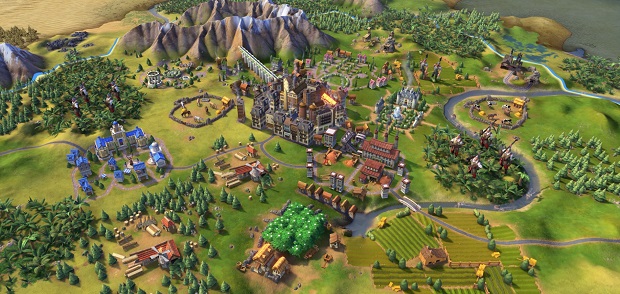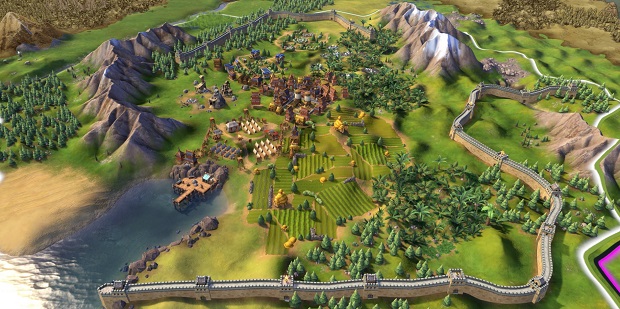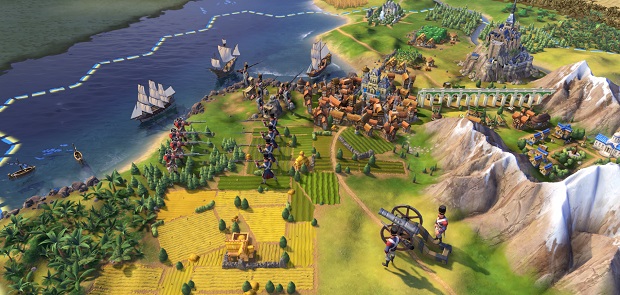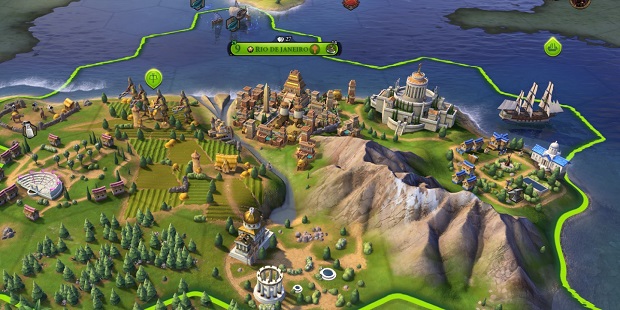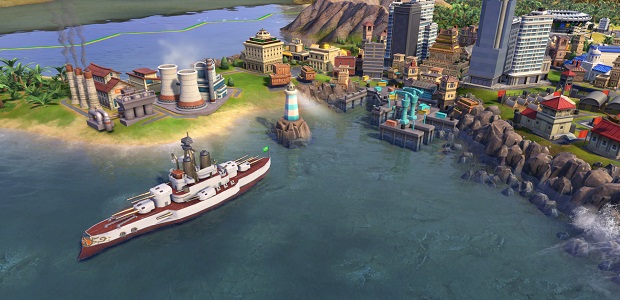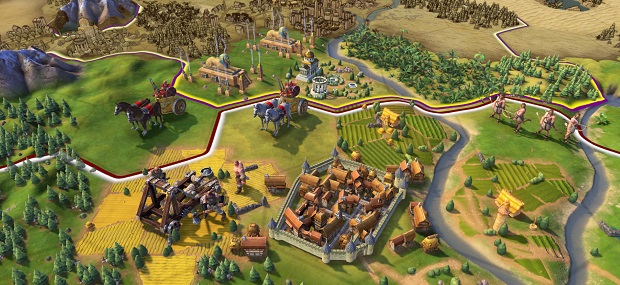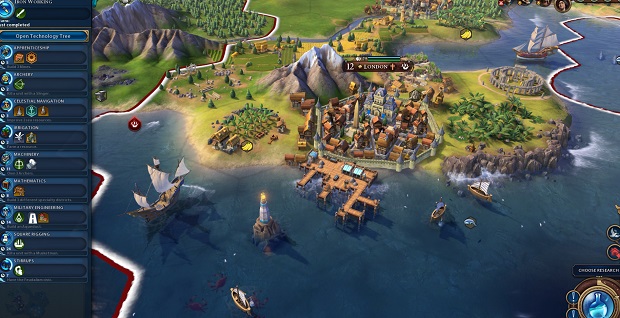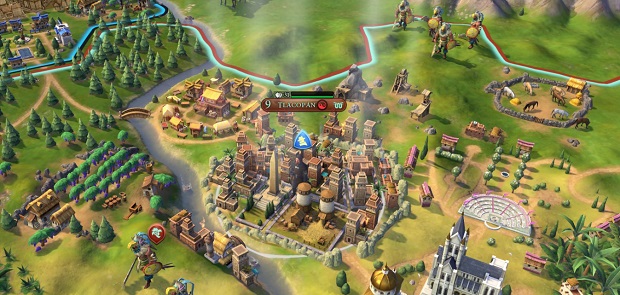Civilization VI: Four Hours Of Wars And Wonders
Deep and revolutionary
Last month I spent four hours playing Civilization VI on a very hot day in central London. I came away wishing I could play for another four hundred hours, and also wishing that I had an ice cream. Mint and choc chip preferably.
Since then, I've spent a lot of time thinking about what Civ VI is doing and how its many systems create a brilliant competitive race through history while also producing some weird tensions around the idea of what a civilization actually is in the context of the game. Are cultures defined by the choices they make, by their surroundings, their neighbours, by determination or by chance? Whatever the answer might be, one thing is sure: Cleopatra hates me.
I'd already spent a brief measure of time playing with the latest in the venerable Civilization franchise when I arrived for the hands-on session. This time, rather than being planted on a purpose-built map with no choice in the setup of the game, I was able to choose from several civs and the world was randomly generated, in either pangaea or continental form. I chose France, hoping that their diplomatic specialisation would allow me to explore that aspect of the game, and to ensure I'd have neighbours aplenty in the early stages, I chose a pangaea. No pesky seafaring required to make friends and enemies that way. We'd be able to gossip and poke one another with sticks right over our garden fences.
Gossip and sticks are important tools in Civilization VI. The sticks are nothing new and combat as a whole is one of the least changed areas of the game, having been completely overhauled for Civ V and now simply refined. Those refinements come in the form of a new support class of unit. As with civilian units, such as settlers or workers, artillery-type weaponry can be escorted by a tougher combat unit rather than left to wander, alone and vulnerable.
There are other methods to evade the one unit per hex restriction as well, including the creation of three-unit stacks. The units must be of the same type, encouraging use alongside other units as is correct for the tactical combat system. They represent a dense block of troops or vehicles rather than a multi-faceted body, and are called 'corps'. Rather than simply rolling off the factory line, they have tricky (and possibly non-renewable) build requirements, emphasising their specialist nature.
But the sticks and stones of war are informed, more than ever, by gossip, rumour and diplomatic awareness. Diplomacy is often one of the weaker points in any 4x game, partly due to the gap between what we expect from a human opponent and what we get from the AI, and partly because treaties and agreements tend to be used to make things happen rather than to explain why things are or might be happening. Civ VI takes significant steps toward making diplomacy work as background noise before it becomes centre-stage action.
Much of that, in the early game at least, is thanks to the gossip system, and that's where the French excel. Led by Catherine de' Medici, they're able to take advantage of her courtiers in the form of The Flying Squadron. As soon as you make contact with another civ they go to work, quietly gathering information and boosting your level of knowledge about goings-on in the world. Every civ can learn about its opponents by opening trade routes or embassies, but France gains one extra level of access immediately thanks to the Squadron and their entertainments. When you're having a ball, it's easy to forget that the walls have ears.
In practical terms, during my playthrough, this meant that I tended to know when my neighbours were considering hostilities. I found myself next to a belligerent Egypt, but I wasn't the focus of Cleo's ire. Not this time. In this version of crisis on infinite Earths, she had a problem with my closer neighbours, the Americans.
The continent wasn't big enough for the both of them.
Thanks to the gossip system (and gossip is always fact, not false rumour), I knew war was coming before the first shots were fired (or, in this case, before the first swords were unsheathed; the year was 500AD). Before meeting with another civ's leader for discussions, you can check recent gossip about the state of their nation. Egypt, the screen told me, was strongly considering military action against America. Thanks to the tendrils of the squadron, even my primitive intelligence system had picked up on some of the advances made by both nations as well as their attitudes toward one another.
Egypt was the stronger, by some distance. And so I picked my side...
Now, all of this information could be gathered in other ways: the placement of cities and border tensions are good indicators of future fisticuffs, and those league tables that every Civ game flashes up from time to time give a good indicator as to where everyone stands in relation to their opponents. What Civ VI has done is create new channels through which information can flow, and that not only opens up opportunities to develop those channels, shaping your nation in new ways, it also makes the world and the numbers that make it up seem more dynamic.
In many ways, Civ hasn't changed a great deal over the years. It's still a game in which history is a more like a race involving several competitors rather than a strategic simulation, and it's still a numbers game. Everything from terrain to tech has specific numbers attached, and whether they define the bonus a city can gain from a tile or the strength of a unit, they're the fabric of the game.
What may be more important than the sweeping changes to cities and a civ's relationship with its geographical surroundings is the way in which Ed Beach and his team at Firaxis are using all of those numbers to build a greater sense of character. Civilizations feel like distinct and somewhat predictable entities now. Sure, you won't understand them completely when you first meet them but when I saw the stormclouds of war gathering, I had a pretty good idea what the Egyptians and the Americans were fighting about, and it wasn't just territory.
More than ever, there's a sense of each civilization being personality-driven and not just in the sense that Gandhi will always be a prick. The historical traits, which are always attached to a specific leader, are more complex than 'aggressive' or 'expansionist'. They have wrinkles in their working, recognising various kinds of superiority and inferiority, and understanding geographical relationships better than ever before. One leader might feel a paternal protective instinct to weaker civs on his own continent, while another might want to cleanse that same home territory of anyone who causes trouble, or seems likely to.
Randomised hidden traits supplement the historical ones. These complicate things and, again, you can receive confirmation of each through diplomacy/espionage, or figure out what they might be through guesswork and observation. Four hours with Civ VI was plenty of time to confirm that the AI is superbly active, making plans and behaving in a believable and competitive fashion. The Egyptians picked off smaller cities and then surrounded Washington, laying siege. They would have wiped out the Americans entirely if the session hadn't come to an end.
While all of that was happening, I was racing down the tech tree. Tech trees, sorry. Civic and cultural advances now live on one tree while the more science-y stuff has its own home. As well as being an expansion of the civics in Civ V, which allow you to customise governments in a much more in-depth fashion this time around, this splitting of research is a further tool to allow varied paths through history. Now, it's possible to create a convincing culturally advanced civ that hasn't bothered to figure out how to make muskets. Opera houses without explosives.
Just as cities are more specialised this time around, defined to an extent by their surroundings as well as your needs and wishes, civilizations diverge from the single starting point. Everything still runs on a linear path, from one era to the next, and to one of several victory conditions, but every player in the game (whether AI or otherwise) much more obviously plots their own route down that path. Religion has been fleshed out enough to be a significant goal in and of itself, rather than a sideshow, and the strict division of culture and science makes concentrating on either feel like a much more important decision.
When Firaxis announced that Civ VI would contain all of the elements present in the fully expanded Civ V, I expected some of them to be stripped back. That doesn't appear to be the case. If anything, every feature has been not only fleshed out but in some cases completely rethought so that it seems entirely new. City states are much more like mini-civs now rather than time-consuming attention-grabbing distractions. Governments and civics form a core system, almost like a tiny collectible card game, that allow you to make nation-wide changes mid-game, some of which provide the same kind of bonuses and abilities previously associated with individual civs.
It's impossible to say how Civ VI will hold up over the years I'm likely to be playing it, or even how the modern eras will function. I haven't even begun to explore espionage and some of the seemingly smaller rule changes, such as the finite pool of shared great people (they exist in the world and you race to attract them to your civ before someone else does the same), will have an enormous impact on long-term strategies. Those who feared a streamlined game - perhaps believing Civ V had begun a trend in that direction in its vanilla release or perhaps misreading the intent of the bright and exaggerated graphics – need not worry. This is a game that is exploring and expanding on almost every feature that the series has covered in the past.
If anything, it'll be too dense rather than too light, and here's where I express a few concerns. There's a slight tension, even in the early stages of a playthrough, between the game's desire to present players with all kinds of tools with which to fashion the character and strengths of their civilization, and the pre-existing templates for those civilizations. The Egyptians who have caused such trouble in both of my campaigns to date will always prey on those with a military technology, but they'll also be defined by the geography of their homeland and whatever secondary trait is randomly selected for them.
Civilization VI appears to be the entry in the series that most wants to revel in the character of its leaders and their civilizations, but also the entry that most delights in forcing reactive playstyles. What you begin as, and what you want to become, might change in the movement from one era to the next, and from the plains to the deserts.
In one iteration of Civ VI, I reckon, there may have been a game where no participant in a playthrough came with preconceptions. You're defined by what you do across time rather than by your name or the qualities of your leader. Those ahistorical traits, such as The Flying Squadron, are often borrowed from a specific time and place that may never exist in the particular world that comes to pass in any given campaign. With the vast toolset that now exists to create a civilization through the process of playing the game – you can populate it with works of art, wonders, customised governments, diverse cities, tourist destinations, cultural ideas – it seems almost regressive to have the choice of a civilization be the first important step in any given playthrough.
That's not to say I'm not fascinated by the apparent contradictions, as well as the weird strategies and builds that people will discover given these bases to build from. A little tension in the design of a game can be a very good thing. It's certainly exciting to see a game in such a venerable series tackling structural issues with such confidence and I'm willing to admit that my idea of dynamic civs without the baggage of any pre-existing historical character or imperative might be one change too many at this point.
Given how much Civ VI is changing, fundamental strategies are going to have to be rethought, and despite their cartoonish on-screen representatives, the civilisations themselves are more dynamic than ever. Here's to four hundred more hours of wars and wonders.
Sid Meier's Civilization VI is due for release on October 21st, 2016.

